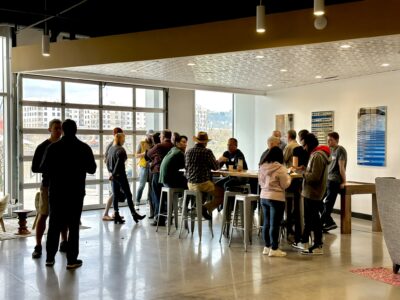You’ve likely been exposed to the concept of a tech incubator:
Innovator pitches a promising idea.
Idea gets shaped and refined.
Incubator provides the necessary resources to launch business.
Hopefully business succeeds.
We’ve been seeing this model spread in clusters far beyond the Bay Area, and that’s because its proven itself as a viable way to bring ideas to life.
But what if this model was applied to industries that have existed for centuries?
This is a question that Galley Group Founders, Benjamin Mantica and Tyler Benson found themselves asking as they entered into their post Navy careers. After frequent deployments in Southeast Asia and the Middle East, the two friends grew very fond of the food markets that celebrated each region’s culture and cuisine.
Like all great entrepreneurs, the two identified an opportunity that wasn’t being tapped into: why aren’t food halls prominent back home?
Less than half a decade later, Mantica and Benson have successfully brought their idea back home as Galley Group, consisting of two food halls in Pittsburgh, in addition to one in Cleveland, Detroit, Chicago, and soon to be Minneapolis – and they don’t show any signs of slowing down.
After sitting down with Galley Group Co-Founder Benjamin Mantica, while he painted a picture of the company’s story, it became apparent that there were clear ties to that of a tech startup, and according to Mantica, that was intentional.
“We had multiple deployments, and being stationed in San Diego often lead our route to South East Asia and the Middle East. We found ourselves in countries such as Japan, Singapore, Thailand, Malaysia, India, Bahrain, and Dubai to name a few. But it was really Tokyo, Singapore, and Thailand that had the biggest impact, with their style of indoor and outdoor street food markets.”
Neither Ben or Tyler were sure if this was a concept that would translate to the US. There was an image of stale food courts that plagued the minds of many Americans and this could be a difficult concept to warm up to.
“If you’re not familiar with a food hall and the price point is $14-15 you’re gonna kind of be shocked – you’re gonna expect $8 options at a mall food court, circa 1990. That’s one big thing we’ve learned – we needed to do a lot of customer engagement, especially in markets that don’t have food halls.”
Early on in the development phase the pair started consulting with those that they knew working with tech incubators and accelerators, picking brains, while figuring out how that business model operated. It was simple: take the bones of a great idea and help get it to market.
While legitimately great ideas may seem few and far between at times, it became very clear that there isn’t a shortage of talented chefs in the world in search of something greater – their own business.
Easy. Right?
“Our first biggest challenge was that you can’t force someone to become an entrepreneur – you have to really, really want it. We can provide the platform, the space, and the infrastructure, but once the person actually gets into the kitchen and has to start cooking, while managing people, sometimes they realize they don’t want to do it.”
This is a challenge that many industries face, hence why a vast majority of entrepreneurs fail. Like many great ideas, the beginning took a lot of trial and error to develop their methodology and to ultimately learn what the pair were good at.
“In the beginning we started with pretty structured classes for our chefs, and we realized that it didn’t work – since everyone was at a different point in their professional development. Some needed assistance in areas that others didn’t care about. Some chefs were further along and basically just needed the platform – they didn’t need a ton of assistance from us, just the infrastructure, which was totally fine. We learned that we can’t critique artists, we have to be agile and it has to be tailored to the individual.”
Like an incubator, the idea is to develop the entrepreneur’s concept and bring it to a reality where it can eventually sustain itself on its own. In this context, the goal is to open a brick and mortar establishment outside the confines of a food hall, which became a reality in the fall of 2018 when chef and owner Pete Tolman expanded his business Iron Born Pizza outside the walls of Smallman Galley, the Galley Group’s original concept.
“Pete is a great example of someone who just needed the platform. He had the experience, he had the team, and he just didn’t have the capital to open a restaurant. Now he’s getting ready to open his second one which is fantastic.”

Iron Born Pizza (Photo credit Taylor Blocksom)
All incubators have their own selection process when bringing on ideas and businesses. Some incubators want completely fresh ideas, and by doing that, expect greater equity in the business; high risk, high reward. Mantica noted that at Galley Group, they don’t take any equity in the restaurants once they are on their own. Because of this, Galley Group learned that they are looking for experience.
“Our place isn’t a place for chefs that don’t have a ton of experience. They really need to be able to hit the ground running from day one and need to understand the true and labor cost – those kinds of things are vital. They’re essentially just running their own restaurant in our space, just on a smaller scale.
Yeah, we obviously provide the infrastructure, but they very much need to be able to stand on their own two feet from the beginning, because unlike a tech incubator, these guys are customer facing immediately, and I think that’s a big deal. Whereas when you’re developing a tech product, software, or hardware, you oftentimes have years before you are customer facing. These guys have a couple of days. So, it’s very different in that sense.”
When understanding that these businesses will be customer facing from day one, it’s important to understand who the customer is when selecting new cities. When asked about what they are looking for when selecting new markets. Mantica admits that his answer would’ve been much less informed had I asked two years ago, but as they work through 2019 he seems to have found clarity around this question.
“I think what we’re looking for are cities that are similar to Pittsburgh in the sense that they have very active millennial populations. We realized that our concept works well in cities that have a really active startup culture, and that makes sense because they are supporting people that are trying to start their own business.”
Mantica’s experience paints a clear image that the food hall model pairs very well with the startup ecosystem and millennial culture. It’s truly the idea of cutting overhead expenses and breaking down the barriers of entry. It’s the era of sharing. Since it’s now commonplace to share workspaces, vehicles, and living quarters – why not restaurants and places of commerce?
Benjamin Mantica and Tyler Benson took a concept that has existed for centuries and molded it to fit the modern, developing city. It makes you wonder if the food halls and night markets of Southeast Asia and the Middle East had similar, if not identical origins; breaking down the barriers of entry for an equitable business experience.
“We wanted to give aspiring chefs and restaurateurs an opportunity at a really low barrier to entry, to come in and essentially start their own restaurant. Then after a year or two with us, take real financials to a bank and not just talk projections – that’s a pretty meaningful thing.”
Galley Group will officially have 6 fully operational food halls after their Minneapolis location opens this summer. The company intends to focus their efforts on up and coming cities with developing startup ecosystems.
As the tech incubator and accelerator model spreads to more and more cities, will we continue to see an influx in food halls?
Galley Group gives us reason to believe so.
Join the conversation!
Find news, events, jobs and people who share your interests on Technical.ly's open community Slack

Pittsburgh weekly roundup: Neighborhood newspaper for tech; Bartel honored at CIO awards; $204M for broadband internet

Revitalizing our coverage to connect Pittsburgh's tech and startup scene

This Week in Jobs: Don't sleep on these 23 tech career opportunities


